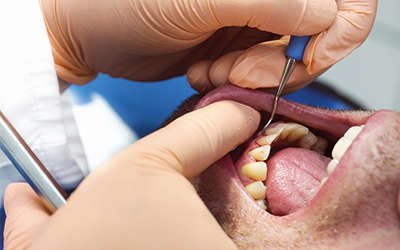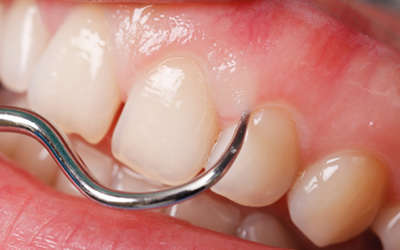


Periodontics is the area of dentistry that deals with the diagnosis, treatment and prevention of diseases that affect the gums, bone and supporting tissues of the teeth. Gum disease is a very common problem and is now the leading cause of tooth loss amongst adults, with many people experiencing some form of gum disease during their lifetime.
Gum disease is caused by a build-up of plaque, a sticky film of bacteria which forms daily on the surface of teeth and gums and causes the enamel to decay. If plaque is not removed by twice-daily brushing and regular flossing it builds up over time, becoming hard and forming what is known as tartar that brushing alone cannot remove.
Only professional ‘deep cleaning’ by a dentist or dental hygienist can successfully remove tartar. The longer plaque and tartar remain on the teeth, the more damage will be caused, resulting in irritation of the gums, making them red and swollen with a tendency to bleed, especially during brushing. This condition is gingivitis, which is a significant yet treatable form of gum disease that can usually be reversed with careful brushing and flossing, and regular visits to the dental hygienist.
If gingivitis is left untreated the gums and bone that anchor the teeth can start to erode and recede, causing teeth to become loose, or possibly fall out completely. This is known as periodontal disease for which there is no specific cure. Depending on the severity of the condition it can be controlled through careful oral care and special treatment from your dentist and dental hygienist.
At Woodlands Dental & Implant Centre our dentists and dental hygienists always carry out a thorough examination of your gums during routine dental examinations to ensure any sign of gum disease is spotted early and treated. Your hygienist can show you how to brush properly and how to use floss and inter-dental brushes to remove food debris and plaque from places your toothbrush simply can’t reach.
If you are worried about your teeth and gums or would like further information about periodontal treatment please do not hesitate to get in touch to arrange a consultation.
 Pritesh is our specialist periodontist who qualified from Kings College London in 2008. He has extensive experience including working in general dental practice on the South Coast and in Central London. He worked in the Maxillofacial department at the prestigious Queen Victoria Hospital in East Grinstead undertaking and assisting in complex head and neck surgeries and difficult dental extractions. He has also worked in a specialist community setting working with vulnerable adults and children as well as undertaking teaching at dental schools. In 2016, he undertook his specialist training at the world-renowned Eastman Dental Hospital, University College London. He gained his specialist qualification in periodontics on a program which is accredited by the European Federation of Periodontology and Implant dentistry. His specialist interest lies in management of advanced gum disease using surgical and non-surgical treatments. Management of peri-implant diseases and soft tissue treatment. He also undertakes training and teaching for fellow dental colleagues. Pritesh also lectures and teaches locally and nationally. His friendly manner, experience and knowledge base places him in an ideal position to treat gum and peri-implant diseases to a specialist level.
Pritesh is our specialist periodontist who qualified from Kings College London in 2008. He has extensive experience including working in general dental practice on the South Coast and in Central London. He worked in the Maxillofacial department at the prestigious Queen Victoria Hospital in East Grinstead undertaking and assisting in complex head and neck surgeries and difficult dental extractions. He has also worked in a specialist community setting working with vulnerable adults and children as well as undertaking teaching at dental schools. In 2016, he undertook his specialist training at the world-renowned Eastman Dental Hospital, University College London. He gained his specialist qualification in periodontics on a program which is accredited by the European Federation of Periodontology and Implant dentistry. His specialist interest lies in management of advanced gum disease using surgical and non-surgical treatments. Management of peri-implant diseases and soft tissue treatment. He also undertakes training and teaching for fellow dental colleagues. Pritesh also lectures and teaches locally and nationally. His friendly manner, experience and knowledge base places him in an ideal position to treat gum and peri-implant diseases to a specialist level.
In his spare time, he enjoys spending time with his young son, socialising and keeping fit. He has also taken part in several triathlons and is currently training for a half marathon.
Dr Pritesh is an accredited specialist Periodontist on the General Dental Council register and treats patients for the following:
If oral health is maintained to a high standard, gums will be pink and firm while keeping the teeth anchored securely in place. Additionally, they should not hurt or bleed when they are touched.
While gum disease is not usually painful, sufferers may notice swollen and redness of the tissue, as well as bleeding after brushing or flossing is carried out.
The signs of periodontitis, which develops if the original problem is left untreated, are usually more severe than that of the aforementioned issue. However, there are a number of additional symptoms to look out for, including:
While the disease can be caused by a variety of factors, the most common basis is a lack of oral hygiene that eventually results in a heavy build-up of plaque. The soft, sticky substance is formed when bacteria collects on the surface of the teeth and can result in long-term issues if left untreated.
There are also a number of risk factors that can increase a person’s chance of developing the condition, with smoking among the main causes of gum disease – as well as the easiest to avoid.
Additionally, diabetes and a weakened immune system can lead to an upturn in risk.
Rather than looking for ways to treat gum disease, it is recommended that patients enquire how best to prevent the onset of the condition. Just a few simple steps could result in individuals maintaining their oral health and perfect smile well into the future.
An efficient hygiene routine includes:
The consequences of not treating gum disease are serious. If the symptoms of swollen and bleeding gums are ignored, the gums can start to erode and the teeth will lose support and possibly fall out. This is known as periodontitis, a disease which can be controlled but not cured.
There is some evidence to suggest that people with serious gum disease are more prone to heart disease, stroke and diabetes, but few people are aware of these links. Maintaining a good level of oral hygiene should be part of your approach to improve overall health.
Patients who have noticed they are displaying some of the symptoms of this condition should arrange to see dentist as soon as possible.
Those who are suffering from periodontitis are most likely to require a referral to specialist periodontist for a detailed assessment that includes X-rays. Depending on the severity of the disease, the specialist will formulate a treatment plan. Usually, the initial treatment consists of thorough oral hygiene instructions (by hygienist), followed by Root surface debridement (RSD) by the specialist.
RSD is the procedure whereby the roots of the teeth are debrided of plaque and tartar hence allowing for reattachment of the tissues. This procedure will require local anaesthesia; you are awake.
| Monday | 9:00am – 6:00pm |
| Tuesday | 9:00am – 6:00pm |
| Wednesday | 9:00am – 7:00pm |
| Thursday | 9:00am – 6:00pm |
| Friday | 9:00am – 5:00pm |
| Saturday | Monthly |
| Sunday | Closed |